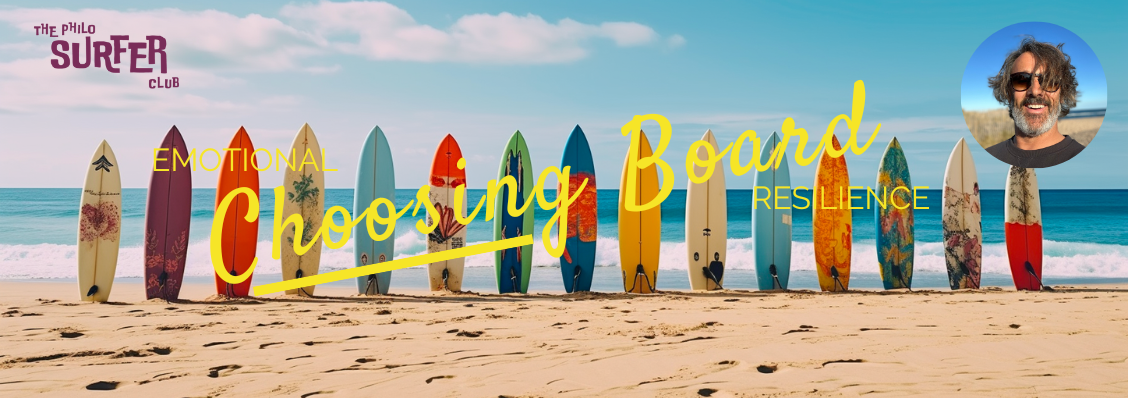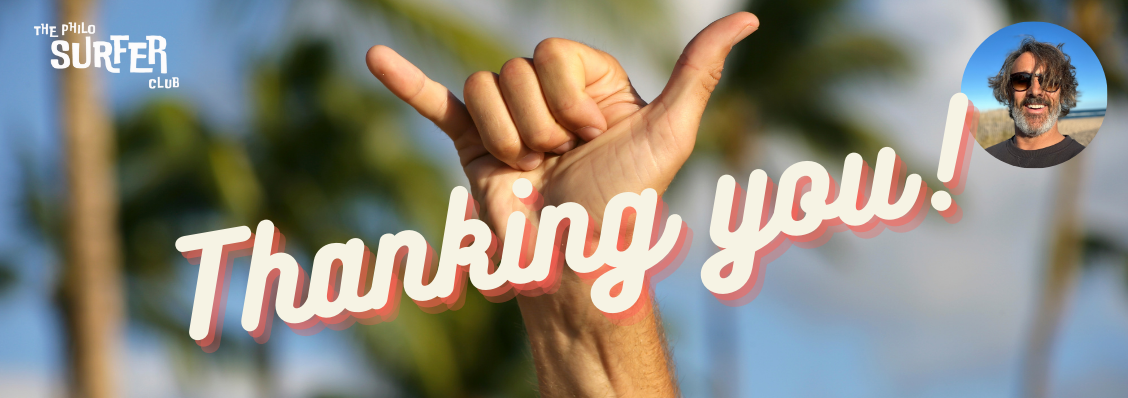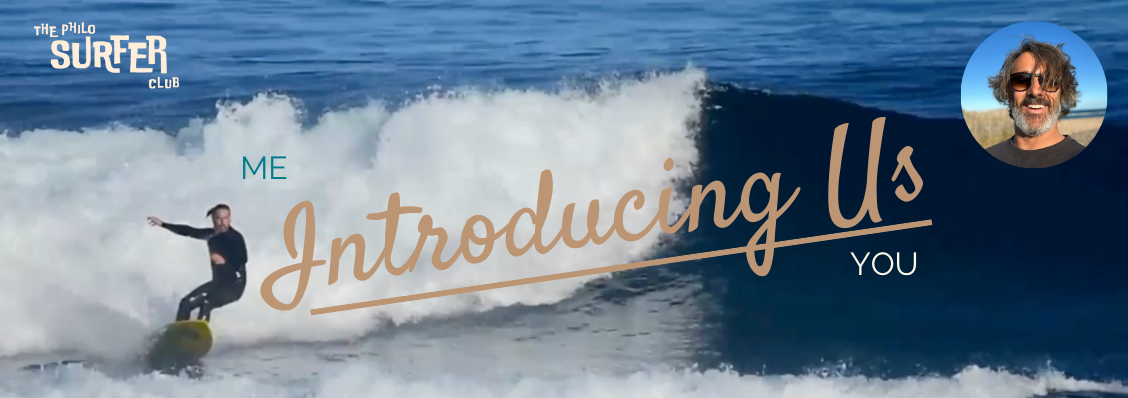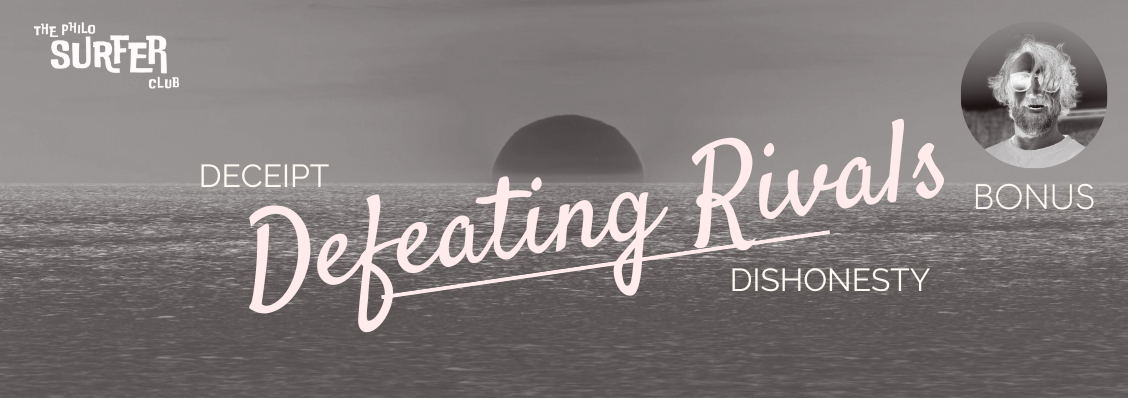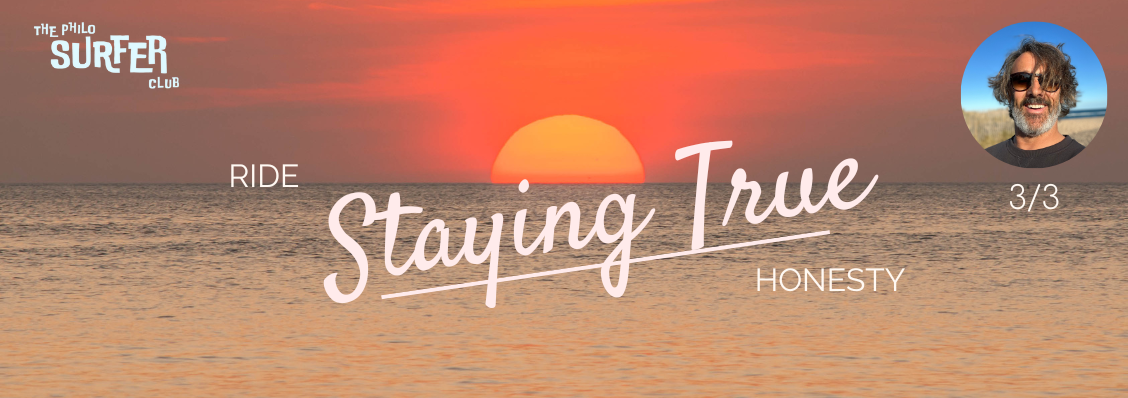Reading time: Kind of long
Aloha, PhiloSurfer!
This week’s newsletter is about one simple idea. Only one. But a crucial one.
Emotional Resilience
We are going to reflect on the different techniques the wisest philosophers have used to:
⬆ increase their emotional well-being
&
⬇ reduce their existential angst.
And, more importantly, how can we use them in our current today’s life.
Each philosopher focused on a set of ideas that they believed could significantly impact us to be calmer than the ocean on a flat day (I know – not the best analogy for a surfer since we’re never calm without swells).
But all of these thinkers have sought the same Holy Grial:
A life’s ride as smooth as a single-fin on a glassy day.
(A much better comparison, uh??)
So get ready for some philosophical cooking.
This week I want to share with you my recipe for dealing with the ups & downs of life.
More than a simple dish, I have put on my chef hat to create a whole tasting menu.
Especially made for you with this season’s ingredients.
Presenting:
My Tasting Menu to Enhance Your Emotional Resilience
Aperitif
Socratic Spritz:
A light and bubbly aperitif that awakens the mind while sparking curiosity and introspection.
Recipe:
Self-examine through questioning.
For example, what limiting beliefs were put in your mind as a kid? Question them to get to terms with yourself.
If it’s about self-defeating, wouldn’t you prefer to be the one choosing what cogs you throw in your wheels?
(Just kidding. Or not?)
Socrates believed that we all possess knowledge within ourselves. It only takes some effort to grasp it (but a little help always is nice).
So if you wanna be wise, look INWARDS.
Starters
Cynic’s Frugal Salad:
A salad of simple greens and olives, symbolizing Diogenes’ detachment from superficial desires.
Recipe:
Detach from superficial desires through contentment.
Diogenes went to extremes living in a barrel and owning almost nothing. Reminds me of the many soul surfers that practice the philosophical van life.
While that level of asceticism may be too much for you, we can all benefit from periodically decluttering the nonessential.
Desires often lead to discontentment. And they never stop if you don’t tame them. Some desires are also very unhealthy.
By focusing on what we have and finding gratitude, we discover inner peace.
Stoic Chickpea Soup:
A hearty and comforting broth with legumes, meant to calm the mind and bring clarity, just like Epictetus’ teachings.
Recipe:
Calm your mind through understanding control.
Epictetus taught the importance of inner peace and mental clarity. He realized that we cannot control or change every external event. But we have power over our perspectives and responses.
As you savor each spoonful of this stew, consider how you can apply Stoic principles to your own life.
How can you navigate the ups and downs with a calm and focused mind?
This dish is a reminder that a tranquil mind can lead to resilience in the face of life’s challenges. Just like eating chickpeas (they naturally boost your serotonin levels; google it)
Reflect on what is within your control, and release anxious thoughts about the rest.
Mains
Virtue-Infused Grilled Salmon:
A salad of simple greens and olives, symbolizing Diogenes’ detachment from superficial desires.
Recipe:
Flourish through purposeful action.
Aristotle emphasized the importance of purposeful action in achieving one’s full potential.
Just as he believed in the pursuit of eudaimonia, or flourishing, this dish is designed to stimulate your taste buds and your sense of purpose.
Each element on your plate has been meticulously chosen to create a harmonious blend of flavors and textures, echoing Aristotle’s concept of balance and virtue.
So take time to identify what really matters to you. Even small steps add up. A sense of meaning fuels resilience.
Freedom Filet Mignon:
A tender filet mignon, accompanied by a variety of complex sauces and sides, allowing you to customize your experience and embrace your freedom of choice.
Recipe:
Create meaning for yourself through responsible freedom.
Sartre believed that we alone define the meaning and purpose of our lives through our choices and actions.
This freedom also comes with responsibility.
Exercise your freedom thoughtfully day-to-day to build an existence aligned with your values.
This forms the foundation of resilience.
Dessert
Taoist Decaf Tiramisu:
A dessert that captures the essence of harmony and tranquility, inspired by Lao-Tse’s teachings.
Recipe:
Go with the flow through detachment.
Epictetus taught the importance of inner peace and mental clarity. He realized that we cannot control or change every external event. But we have power over our perspectives and responses.
As you savor each spoonful of this stew, consider how you can apply Stoic principles to your own life.
How can you navigate the ups and downs with a calm and focused mind?
Wine
Garden of Pleasures Pinot Noir:
A rich and velvety red wine to be savored with friends, embodying Epicurean enjoyment of simple pleasures.
Recipe:
Seek simple pleasures with your friends.
Epicurus taught that pleasure and friendship are key to a happy life. But he did not mean indulgence in exotic luxuries.
Rather, life’s greatest joys come from modest delights shared with close companions – e surfing sesh’, a delicious meal, lighthearted conversation, seeing others smile.
Make time for such non-productive moments (il dolce far’ niente).
They nourish the spirit and remind us of what truly matters, enhancing our resilience.
When challenges arise, the memory of joyful connection sustains us.
TL;DR
Want to feel good?
Pick your favorite philosophical practice (see table above) & craft your own personal life philosophy.
I hope you’ll enjoy this menu.
I have prepared with all my love.
These recipes are the ones that I use when life’s doesn’t look like a beach any more.
And they are exactly the philosophers taht we will cover in my forth-coming course (see details below).
Bon Appétit!
* * * * *
I have created a course on How Philosophy Can Soothe Your Soul in 5 modules:
- Introduction: The power of self-knowledge (Socratic life coaching)
- Module 1: How to deal with anxiety like a Stoic thinker (or a big-wave surfer)
- Module 2: How to manage expectations like a Cynic guru (or a soul surfer)
- Module 3: How to fulfill your purpose like a Peripatetic student (or a pro surfer)
- Module 4: How to be happy like an Epicurean virtuoso (or a stoked kook)
- Module 5: How to live in harmony like a Taoist master (or a smooth longboarder)
- Bonus: How to face death like an Existentialist intellectual (or a solo surfer)
Starts on Sept. 19th.
3 weeks.
Tuesday & Thursday.
90’ sessions.
Only 4 out of 12 seats ava¡lable.
Just click here if you’re interested in knowing the details.
Additional recommendations:
- “Barbarian Days” by William Finnegan – This memoir takes you on a journey through the author’s life as a surfer, offering vivid descriptions of waves, cultures, and personal growth. It presents surfing as a metaphor for life’s challenges and opportunities, reflecting on the pursuit of passion and the quest for meaning.
- “Symposium” by Plato – This ancient philosophical dialogue explores the nature of love, beauty, and human connections through a series of speeches given at a banquet. It delves into the complexities of desire and relationships, offering insights into the human condition and the pursuit of deeper connections.
- “Saltwater Buddha” by Jaimal Yogis – This memoir intertwines the author’s experiences with surfing and spiritual seeking. It explores the parallels between riding waves and the journey of self-discovery, offering a reflection on finding purpose, peace, and inner transformation.
- “Fear and Trembling” by Søren Kierkegaard – This philosophical work delves into the story of Abraham and his willingness to sacrifice his son, Isaac, as a means of exploring the nature of faith, ethics, and existential dilemmas. It encourages contemplation on the complexities of morality and the individual’s relationship with the divine.
- “Caught Inside” by Daniel Duane – This book delves into the world of surfing, offering insights into its culture, history, and the spiritual aspects of riding waves. It combines personal narratives with reflections on the deeper meanings of surfing, making it a thought-provoking exploration of the sport’s impact on identity and life.
- “Nicomachean Ethics” by Aristotle – This philosophical treatise addresses the nature of human well-being and the virtues that lead to a fulfilling life. It explores concepts such as moral virtue, friendship, and the pursuit of eudaimonia (flourishing), providing a framework for ethical living and self-improvement.

